Is Spinosad Safe For Cannabis Plants?
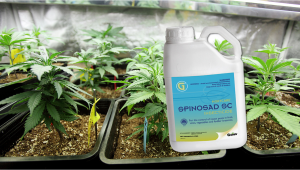
- 1. Preventive measures for your cannabis crop
- 1. a. Keep everything clean
- 1. b. The right growing conditions
- 1. c. Choosing the right strain
- 2. What is spinosad?
- 3. What is spinosad effective against?
- 4. Why is spinosad banned in some countries?
- 5. Homemade alternative to spinosad
- 6. Other pesticide options
- 7. Spinosad most common questions
- 8. In conclusion
Spinosad is a broad-spectrum natural insecticide found in many store-bought products and it’s used to kill a wide range of pests that can affect cannabis, from spider mites to caterpillars due to being 100% organic and super effective. But despite being completely organic it has been banned in several places around the world. So if you want to know if it’s safe for humans, cannabis seeds and plants read along!
1. Preventive measures for Your Cannabis Crop
Several different measures can be taken in order to avoid bugs and pests in your cannabis plants. This is quite common indoors but almost a rule outdoors, and although you can try to control a bug infestation by raising or lowering the temperature and humidity levels, some bugs just reproduce extremely fast and need more extreme measures. So you should always start a prevention plant in order to ensure the plants grow healthy and can show their full potential during the flowering stage. This means that if you’re looking to get the best quality and yields possible, make sure to read the following tips.
Keep Everything Clean
Keeping things clean is vital to avoiding bugs, pests, and diseases in your cannabis plants so make sure to remove dead leaves or any other organic material leftover and make sure to keep the trays, containers, and insides of the grow tent clean at all times. This should be done weekly. Another good tip to prevent bugs is to remove the 2 lower branches as this will improve airflow and prevent bugs from attacking the lower parts of cannabis plants.
The Right Growing Conditions
Maintaining the right conditions in your grow tent will not only allow plants to grow big and produce more flowers but will also help avoid bugs or diseases. In order to keep the right conditions during the different plant growth stages, you will need certain equipment. Now, it’s not obligatory as your plants will also grow in less-than-ideal conditions but for the best results, you will need an air conditioning unit and a humidifier (or dehumidifier). You can also put anti-bug nets on the intractor/extractor tubing so bugs cannot get in.
Choosing the Right Strain
Now, apart from all the preventive measures mentioned, it’s highly recommended to select strains that are naturally resistant to bugs and diseases as this will prevent a lot of problems right from the beginning. So always make sure to go for the strongest strains that will thrive in your specific conditions to increase your chances of reaching harvest without problems.
2. What is Spinosad?
Spinosad is an organic insecticide produced when the soil bacteria Saccharopolyspora spinosa ferments two different compounds: spinosyn A and spinosyn D. After fermenting and mixing these two compounds, the final product becomes toxic and attacks the bug’s nervous system, killing bugs by contact or ingestion. Now, despite being toxic, spinosad is only toxic to smaller bugs. This means that spinosad is a good choice for dealing with the most common cannabis pests but may not be as effective against bigger bugs, which can be an advantage if you’re an organic grower and use beneficial bugs to take care of your garden.
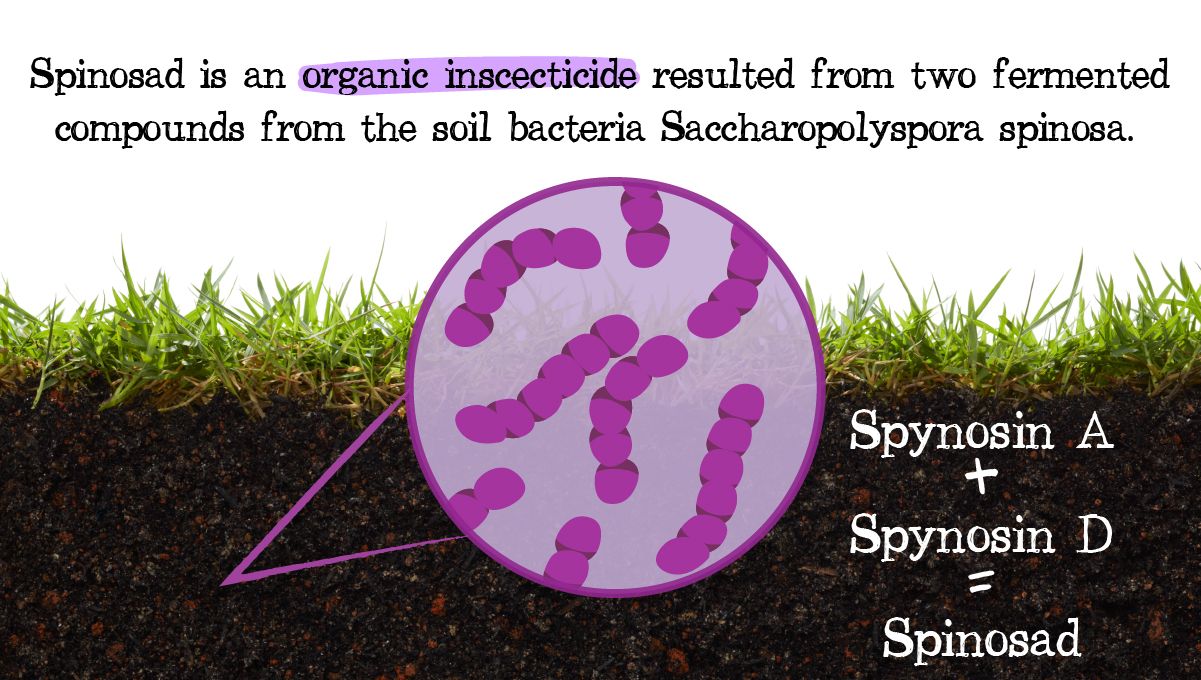
This kind of product is usually used as a foliar spray and can kill bugs within 2 days of ingestion or contact while staying effective for 24 hours outdoors and even months indoors or in a greenhouse where the product won’t get washed off by the rain. Apart from dealing with cannabis pests, spinosad is also used to deal with fleas on pets and sometimes live on humans due to being harmful to small bugs but not to humans and pets in normal applications.
3. What is Spinosad Effective Against?
Spinosad can fight off and kill the most common cannabis pests such as:
- Aphids;
- Leafminers;
- Spider mites;
- Thrips and;
- White flies.
But if it’s so effective, why is it banned in some places? Well, as mentioned, spinosad is toxic to most bugs that attack cannabis but it also means that it’s toxic to all other small bugs, including those that don’t affect cannabis, such as butterflies and honey bees, for example, which is extremely bad for nature if you don't use it responsibly.
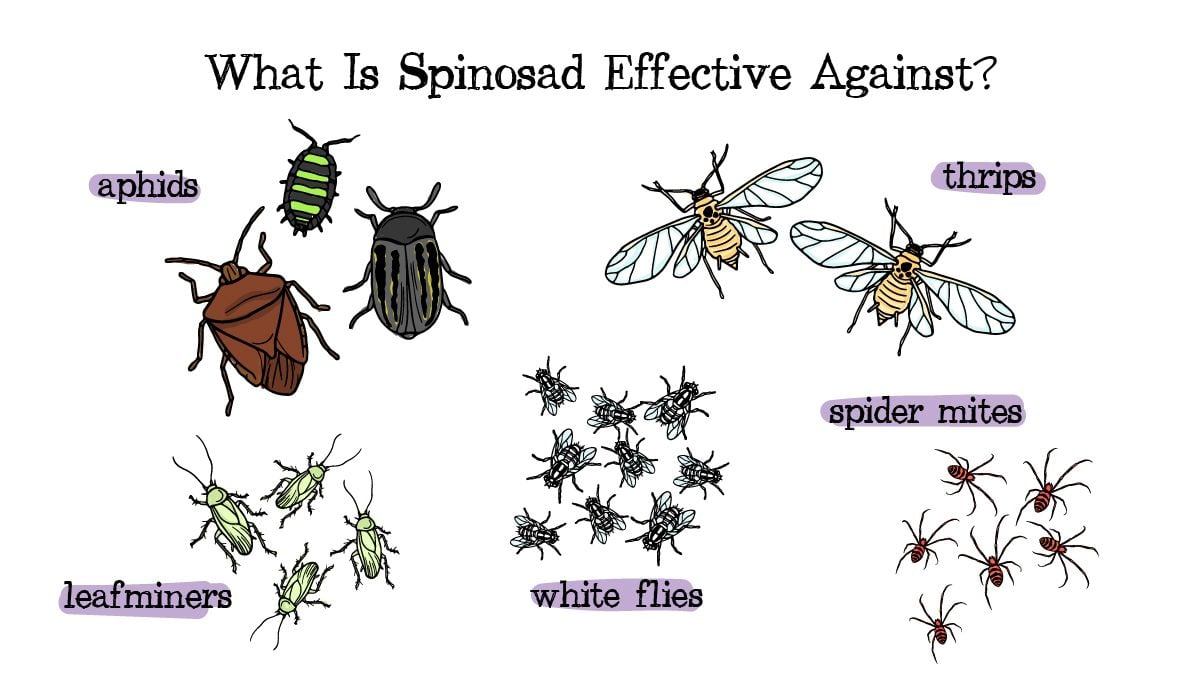
Another big issue is that despite being safe for use on edible crops, meaning that you can eat the vegetables after using spinosad, there isn’t much information on how it can affect you when smoking it.
4. Why is Spinosad Banned in Some Countries?
As mentioned, spinosad is safe in regular amounts but due to not having enough evidence on the long-term effects when smoking it, spinosad has been banned for sale or commercial cannabis grows in several places. This doesn’t mean that spinosad is bad for your health but due to not knowing the potential effects, companies just want to stay safe. Spinosad is currently banned for commercial cannabis grows in Michigan, Montana, Oklahoma, Oregon, and Washington and is completely banned for sale in Canada and Denmark. If you were looking for an organic way to deal with bugs and can’t find spinosad there’s no need to worry, Neem oil is another good alternative and if you’ve tried Neem oil and it didn’t work, read along for a super effective homemade recipe.
5. Homemade Alternative to Spinosad
Despite being organic (and highly effective) we still don’t know the possible long-term effects and that it’s more than enough for a lot of home growers and commercial cannabis growers to avoid spinosad. On top of that, there are a lot of alternatives to spinosad so if you’re looking for a broad-spectrum insecticide you may get the same results with other natural products, insecticidal soaps, or even with your own DIY alcohol mix, such as the following:
| Homemade Alternative to Spinosad | |
|---|---|
| Ingredient | Amount |
| Isopropyl alcohol | 3 tablespoons |
| Mint | 5 medium-sized leaves |
| Garlic juice | 3 tablespoons |
| Cinnamon | 2 teaspoons |
| Lemon juice | 3 tablespoons |
Remember that you don’t need all the ingredients mentioned in the table, as long as you at least get the alcohol, and one ingredient more it should work but the more you add the stronger the result. So once you have the ingredients, mix all of them in a small bowl and then dilute one teaspoon per 600ml of water, preferably in a blender.

After mixing you can go ahead and use it, just have in mind that this homemade alternative may be too strong for some plants so make sure to test it to one leaf before applying it to the whole plant!
6. Other Pesticide Options
Spinosad is a great option for pest prevention and eradication, but how about other pesticides? Are there other organic options on the market as effective? While Spinosad is the strongest organic option, and probably the most powerful of the organic pesticides, there are a couple of other choices out there for people who live in areas where its use is banned, or for those who want to try some slightly less harsh options out first.
Pyrethrins
Another alternative to pesticides is Pyrethrin spray, which is made from ground-up chrysanthemum flowers and works as an insecticide that can act as a repellent or stunner for insects. Pyrethrin works by attacking the nervous system of pests, which quickly leads to paralysis and ultimately, death. Sounds a little dodgy, but nothing to worry about as it is almost totally nontoxic for humans and other large animals.
Pyrethrin spray has a very short half-life and is quickly washed away by any contact with water. This is great if you are looking for an easy-to-flush pesticide option, but can be a bit of a downer if you are needing something that has long-term effects. Just be sure to regularly spray affected plants for the best effectiveness with pyrethrins.
Neem Oil
Neem oil is one of these alternatives. It doesn’t work quite as quickly or effectively as Spinosad, but it is still an effective pesticide. Neem oil works in a double-action process and is quickly becoming the go-to organic pesticide option for most hobby growers.
Containing a few important active ingredients, Azadirachtin being the top of that list, neem oil works by not only covering the insects in an oily layer that prevents normal bodily function, but also interferes with insect hormone systems, and makes it harder for pests to lay their eggs. The oil works to strip away the waxy outer coating of pests and make them unable to feed on plants, ultimately killing them off. Neem Oil also acts as a fungicide, making it a great all-around organic pesticide for cannabis farmers.
Insecticidal Soap
Another two-pronged attack, insecticidal soaps work by washing away the protective oil coating that most cannabis pests have to protect their shells and bodies. This makes it difficult for pests to survive in the environment, as they are unable to keep their own exoskeletons hydrated. Once this layer has been thoroughly broken down, the soaps then strike the cell membranes and quickly break down cell walls. When using insecticidal soaps, make sure to really saturate the entire plant and be sure to apply it multiple times a week for the best results. Just like pyrethrins, insecticidal soaps break down in water pretty quickly so multiple per week applications are required when combating heavy infestations.
Diatomaceous Earth
While not a pesticide per see, diatomaceous earth (or DE as it's popularly known) is a great way to keep pests away from plants. Comprised of the finely ground fossilized remains of tiny, aquatic organisms called diatoms, diatomaceous earth is an effective preventive treatment against any and all insects that have a hard exoskeleton. The fine powder is abrasive on the microscopic level and kills the bugs by piercing the hard outer layer and quickly causing dehydration. It can be applied by sprinkling a light coating around the base of plants and other vulnerable areas, and can also be mixed with water and sprayed directly onto the plants as a foliar option if needed. It is totally non-harmful to humans and other larger animals.
Beneficial Predatory Insects
If pesticides aren’t your thing, you can always look into introducing beneficial predatory insects that will attack pests on the plants. Predatory insects such as ladybugs, lacewings, and pirate bugs all feed on pests like aphids, mites, thrips, whiteflies, mealy bugs, and other common cannabis pests. They work by feeding on both the larvae and the full-grown adults themselves, all while leaving the crop well alone.
7. Spinosad Most Common Questions
In case you still have more doubts about spinosad and spinosad products, here are the most common questions on how to better use and apply spinosad.
I think I used too much spinosad on my plants, what should I do to fix it?
Spinosad products will not hurt your plants unless you use huge amounts of it. This means that it probably won’t burn your plants but might clog the stomata and affect transpiration so it’s recommended to foliar spray with plain water to remove the excess.
Can I use spinosad as a soil drench?
Most spinosad products are designed to be used as a foliar spray, not as a soil drench because most of the bugs that attack cannabis are usually on the leaves and branches. If you need to use it in the soil make sure you buy a product that can be used as a soil drench.
When should I reapply spinosad?
You should reapply spinosad every 1 - 3 weeks depending on the gravity of the bug infestation.
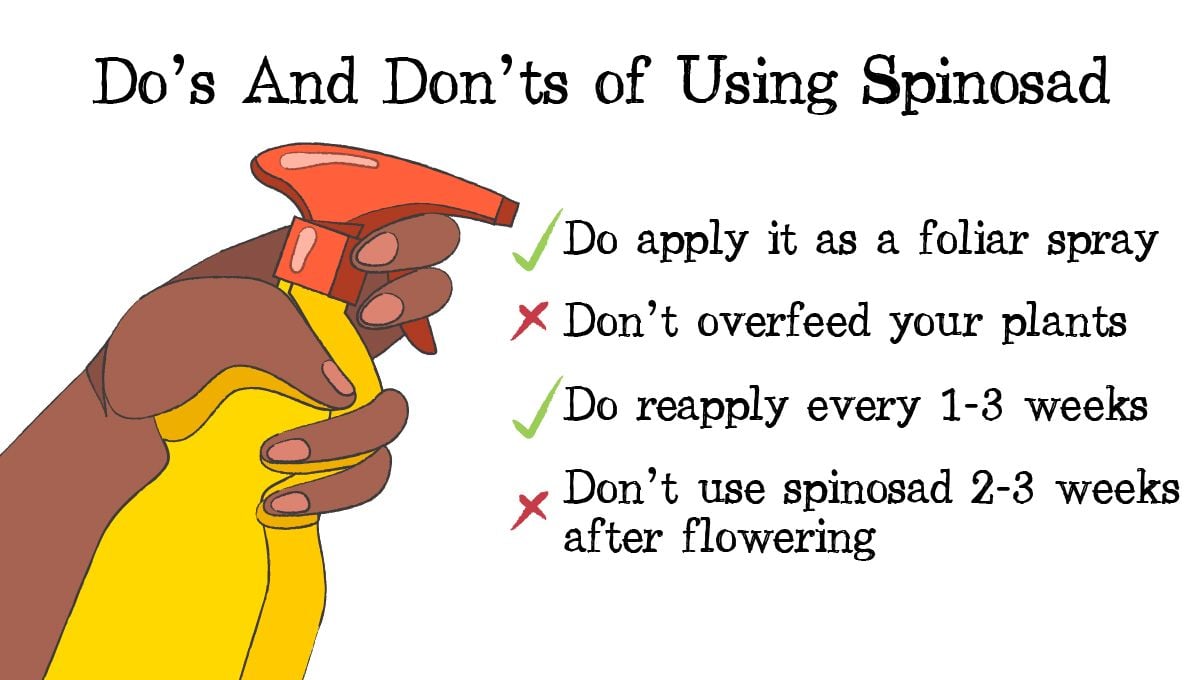
Will spinosad kill the beneficial bacteria and fungi in the soil if I mix it in the nutrient solution?
It might take 2 - 3 applications for the spinosad to kill the beneficial microorganisms in the soil but it will definitely kill them so make sure to respect the manufacturer’s recommendations and try to avoid using it in the soil.
I’ve heard you cannot use neem oil during flowering, can I use spinosad instead?
It’s not recommended to use spinosad after week 2-3 of flowering because it can affect the aroma and flavor of the buds, so make sure to use it during the vegetative stage to prevent bugs during flowering.
How should I apply spinosad?
In order to kill the bugs effectively, you should spray all the leaves, including the underside of the leaves. Also, remember to spray 2 hours before the lights turn OFF or spray when the lights have turned OFF. Remember that spinosad has to be ingested in order to kill the bugs so in order to kill all of them, make sure to reapply 1 week later in order to kill the newly born bugs, and if you see more bugs hatching, reapply 1 week after the second application.
8. In Conclusion
Spinosad has been used on edible crops for years due to being super effective and 100% organic but due to the lack of research when smoking it, most commercial growers are banned from using it. Because of the ban, it can be fairly hard to find spinosad products and definitely not recommended if you’re growing cannabis due to the potentially harmful long-term effects being unknown so if you’re looking for organic insecticides make sure to try Neem oil or experiment making your own homemade insecticides. Now, this doesn’t mean that using spinosad is bad for you but you want to avoid any possible health problems so we highly recommend using other organic alternatives, there are at least a few dozen products that are as effective as spinosad without the possible harmful effects.
If you've used spinosad products before feel free to share your tips and tricks in the comment section below!









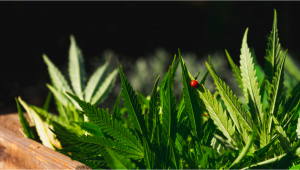
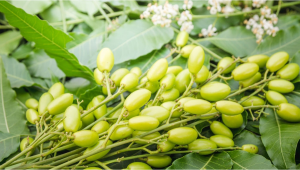


Comments